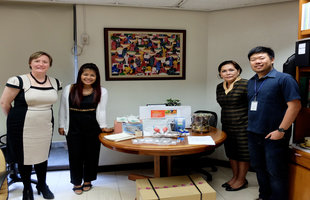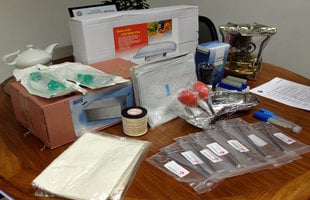
In support of the Department of Health's Doctors to the Barrios (DTTB) program, WHO Philippines donated 32 health post kits to the Development Academy of the Philippines-Graduate School of Public and Development Management (DAP-GSPDM), where the DTTBs are enrolled in a Master's degree program. These health post kits contain essential medical tools and supplies to be distributed to DTTBs serving the Yolanda-affected areas in the country.

The DTTBs program sends doctors and nurses to remote communities and hard-to-reach areas to address the lack of medical services in the countryside. The academic degree acquired by the doctors from DAP-GSPDM is part of their deployment. This graduate school program equips doctors and nurses with tools and knowledge on public management, improvement of health outcomes and the augmentation of the need for health personnel.
To congratulate the DTTB program, WHO Philippines Country Representative Dr Julie Lyn Hall delivered an inspirational speech to all the 2014 DTTB graduates:

Thank you very much. Really it’s a great honour. Please do be seated. It is a huge honour for me to be here today and incredibly inspiring listening to all the awards, hearing about all the projects and things you have been doing. And I really wish to thank you very much for inviting me to the graduation today. Senior Vice-President Bernie Dizon, Dean Mercado, Director Ronquillo and Representative Hontiveros, thank you so much and thank you also for your inspiring speech. But above all thank you to the graduates. Seeing the energy and hearing your stories. And the theme of my speech today will be about courage because it is what all of you have shown in huge quantities. I’ve heard some of your stories, not all of them. I wish I could have been here yesterday because I gather you had an exhibition showing some of your work, telling your stories, and I hear from a few insiders that during that session you also share your very personal stories and those are stories of great courage. Stories of courage and willingness to go work in places where no one else is working as a doctor; stories of courage to stay at your post during typhoon Yolanda and many of you hitching rides on c130s in order to be able to get into the most-affected areas. And really stories of courage about how all of you, you’re not on the standard beaten path, you’re not there working in a hospital doing the normal thing that a normal doctor does, you have the courage to step forward, step off that path and make your way in life.
So a big round of applause to all of you for that. But listening to that, and hearing the stories of not just the batch that is just graduating but the batches that graduated before you, it made me think what is courage. What is this word courage that we talk about? And I have a few ideas. I think, above all, courage is the courage to care. It takes a lot of courage to care, to care about a fellow citizen, a stranger you don’t know when you are a doctor, to care enough to help them in the middle of the night--- the woman who is bleeding, that small child who has pneumonia. It takes a lot of courage to do that kind of caring. It takes even more courage to care about people who come from very disadvantaged backgrounds and from areas and cultures perhaps are a little different from yourself. So courage is about caring and you’ve shown it and will continue, I’m sure, to show it in abundance. But caring is also about the ability to commit, to keep going, no matter what, and that takes great courage as well. Now when you’re a clinical doctor, you often see your results fairly quickly. But when you move into public health and public management, it takes a long time to see those results and you have to keep going and keep going. And the courage to continue, even when you’re not seeing results, the courage to trust your intuition that these investments will reap benefits is another form of courage.
And I think it’s also the courage in being able to stand up and count. Count data in an objective and honest way. Count people, count their health needs again in an honest and objective way. A lot of work I’m sure that you have been doing is about collecting that information and presenting it in a way that is honest, and open, and objective, but in a way that will generate change. And I was saying before this session, that when I did public health, I was told at the end of this, you will be trilingual---you will be able to speak three languages--- speak the language of medicine, the language of management, and the language of politics, because in fact, all three of those are needed to make change. But the languages of medicine, language of management, language of politics, require objective information, and it requires courage to count it, and be counted, and stand for it. And again all of you will have done that in your projects I’m sure showing huge amounts of that and I’d like to say another round of applause for that courage.
So caring is important, committing and continuing despite the hurdles is important and so is counting and being counted, that’s important and they’re very important aspects of courage. But I was also thinking back over my years, I won’t say how many, but years in public health and in medicine and I thought there are two other aspects of courage that I would like to share with you today. And they may or may not make much sense to you but I’m sure that you’ll recognize pieces of these and I hope that maybe you’ll take some of these away with you and when you reflect on your graduation, perhaps these are the ideas that you’ll reflect upon and use later in your career.
One of them is the courage to make a decision, to not stand back and make no decision. And as somebody famous whose name I’ve just forgotten said, “The path to hell is paved with indecision” and it most certainly is. But the courage to make a decision is an enormous thing, and I’m sure that all of you, at three o’clock in the morning, faced in an area and a situation you are not sure of, you have had to make a decision when the answer wasn’t in a textbook for you. Now, one of the most pivotal moments for me as a public health physician was during SARS, at the very beginning of SARS. And I was summoned from the Department of Health in England, I have never done international public health before, and the introduction to me was very lovely, and I thank you for that. But I really do just come from a small farming town in Yorkshire, and I’m the first in my family to go to university and that’s probably the same for many of you out there. So I was really surprised when suddenly they said, “would you like to go to Geneva to WHO headquarters in Switzerland?” and I said, “okay, fine”, and I went there and two weeks later SARS started. I was thrown into the middle of the SARS crisis, and I found myself in the first week of SARS, in a press conference, with hundreds of cameras, sat next to some of the world’s experts, not quite sure why I was there. I think it was them upon seeing me just shoved me up on the stage, and the journalist asked some very sensible questions. They said, “What is the death rate of SARS?” “How is it transmitted?” “How are we going to stop it?” And I sat there, amongst all the world’s experts, and I looked around, and I realized, that nobody, at that point in time, knew the answer those questions. Nobody. Because it was a new virus. It was a new disease. We’ve not seen it before. I did not know the answer but I knew a decision had to be made, that we had to go back to basic principles, and we had to be able to issue guidelines and recommendations, and go into the area of unknown. But without making a decision, the world would have suffered significantly more and the decisions that were made when you look back now in hindsight, were pretty close to accurate. Little changes were made as we got to know more, but having the courage to go back to basic principles and make decisions even when you’re uncertain is incredibly courageous. And I’m sure all of you have done that and will, as your careers progress, be forced to do that more and more and more. The textbook only takes you so far, your experience, your heart, your head, your courage, is the thing that will help you into the future.
And then I have one final area of courage, and this may sound a little strange, and I think it’s the courage to cry and I’m sure many of you have felt that yourselves. There are times in medicine and in public health that are incredibly difficult, and we all end up shedding a few tears. Whether it is with others, whether it’s quietly at night, whether the tears come out or whether they’re inside, the courage to cry is very, very important. And I’ll tell you why. If you want to change things about the world, which you do, you wouldn’t be on this program and you would not have graduated, if you weren’t here to do that. It’s hard, it’s tough, and there will be many moments that you will need to cry. But to change means that you get a little seed and you put it in some fertile ground. Now all of your learning that you have had over the last few years has taught you how to make that soil fertile. Who you need to speak to, which information or data you need, getting your stakeholders on board, speaking medicine speak, speaking management speak, speaking politicians speak, in order to be able to make the ground fertile, and you plant that little seed. But the seed needs watering and many of those tears will be the water that helps that seed grow. And it is hard and it is tough. But the courage to cry, to be able to admit when things are tough and to be able to reach out, and to use those tears to water that seed, is incredibly important. And those tears are also little diamonds. And if you look at a diamond, it twinkles and it has many facets to it. And if you look at the diamond and look through it, you see the world slightly differently, because it’s a little prism that can help to break the light up, and create rainbows.
So, the courage to care is very important. The courage to commit and continue is very important. The courage to count and be counted is important. The courage to make decisions, when you’ve gone beyond the textbook, is very important. But the courage to cry is also incredibly important. And perhaps when you look at your certificates and diplomas, perhaps just reflect those moments when you did cry and what you did to take that step forward to keep going. Because you’ve all done that and you all need to do it again in the future and look at back with pride and say “It gives me courage to keep going.” Thank you. It’s been an honour to be with you all.
